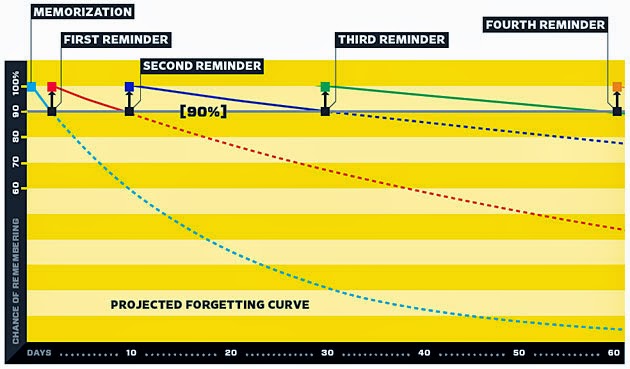 |
| Image source: http://archive.wired.com/ medtech/health/magazine/16-05/ff_wozniak |
A spaced repetition program such as Skritter is built around efficiency. The goal isn’t to make you remember everything, it’s to make sure that each minute you invest will give you as big a return as possible. In the long run, this will improve your learning a lot.
In Skritter, you can adjust the retention rate, i.e. how large a percentage of the vocabulary you want to remember. You can do this by going to your account and changing the study settings. This roughly means that if you use Skritter regularly with the retention rate set to 92%, you should know roughly 92% of the words at any given time.
The upshot of the above discussion is that a healthy study strategy includes forgetting a relatively large number of words. However, I think it’s a mistake to just treat this as part of the natural process of learning and just continue studying. It does matter what you do with the words you forget.
Let’s look at a few common scenarios:
-
Pretend that you actually knew the word and grade yourself better than you deserve. That’s a form of cheating where there is no winner and you are the only loser. I’ve written more about this here. You should never do this, it’s terribly bad for your learning in the long run, even though it might feel better in the short run.
-
Mark the word as forgotten and keep reviewing, leaving the failure behind as quickly as possible. In the worst case, you don’t even look closely at the word you failed to see what and why you failed, you just click next immediately and trust you will learn the word later. You might, but it’s also likely you keep doing this for a number of words in your deck, wasting time every time you do so.
-
Look at the word and actively determine what should be done with it and take appropriate action. This is what I think everybody should be doing, but I have a feeling that it’s not as common as it should be. This requires some elaboration. Having an active attitude to vocabulary learning is very important.
The most important word in this subheading is “actively”. This means that you can’t treat all characters and words equally, you need to adjust to each situation and base your action on many different factors.
Here are a few things you can do with a forgotten character or word:
-
Delete it. Do you need this word? If you probably don’t, delete it. If you’re not sure, delete it (it will surely appear again in your listening and reading, and you can add it again later if you want to). If you know you really need the word, keep reading this list.
-
Edit and upgrade the word. Actively look at the information you have and make it better. Create a new mnemonic (the last one obviously didn’t work), add a custom definition or expand the current definition. Draw a picture. Spend some quality time with the word.
-
Drill down and learn more. Look up the individual characters in a word or the character components in a single character. Use another dictionary if the current definition doesn’t suit you. If you’re confusing two characters or words, look them up, you’re unlikely to be the first to confuse them.
-
Add supporting characters and words. If you can’t get a character to stick and it’s an important one, add other words that also contain the character. If you keep forgetting how to write 凝, add several common words containing that character. You will see it a lot in the near future and you have a chance to really get to know it (and the new words, of course). You can add words from Skritter (web version) or use Hanzicraft to get a quick list of frequency-sorted vocabulary (for 凝 that would mean 凝固, 凝望, 凝聚 and 凝视 (凝視).
